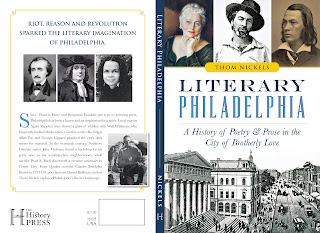THE LOCAL LENS
THOM
NICKELS
The City of Philadelphia Philadelphia Alabama New York Hunter College Harlem as a young girl, then
studied for a while at New York University San Francisco State
In
2011, the 77 year old poet, teacher and activist Philadelphia Philadelphia Philadelphia
With poem titles like “I Still Have Keys to the Apartment,” “Bran Muffins
Have Nothing to Do With it! So There!” and “Leaving the Only Bed in America
That Keeps Me Satisfied,” Conrad’s irreverent style might not go over at the
city’s Union League but his cult following is symbolic of poetry’s status in
the city. The “new style” Philadelphia Pittsburgh Republic of South Vietnam Crimson River
Another great Philadelphia North Philadelphia , who was ordained a priest by John
Cardinal O’Hara in 1959. Fr. McNamee, who has spent most of his priesthood
serving the poor and disadvantaged, is credited with bringing Dorothy Day’s
Catholic Worker movement to Philadelphia Villanova University Northern Ireland Philadelphia
While the mystical poems of a priest might
not be ideal to represent the City of Philadelphia ,
a secular mystic poet like Leonard Gontarek, the recipient of five Pushcart
Prize nominations. Like the Philly poet Jim Cory, author of a number of books
and chapbooks and editor of the 1997 Black Sparrow Press edition of James
Broughton’s poems, Packing Up For
Paradise, Gontarek’s Wallace Stevens
insurance salesman look means that neither he nor Cory would be
“recognized” as poets in the street, at least if one is going by the “uniform”
of younger urban poets which tends towards affectation, such as the arrangement
of neck scarves. This style can range
from the minimalist placement of one scarf to the piling on of two or three so
that one thinks of café habitués in Paris
or of certain Middle Eastern revolutionaries. While the poetic uniform is
usually relegated to the young—consider prose writer George Lippard’s
flamboyant dress—other poets seem happier to blend with the scenery much the
same way that Walt Whitman, who dressed as if he was a farmer, blended in with
his Camden townsfolk.
Jim Cory believes that poetry can be different
things to different people at different times, and he told me that when he was
12 he stumbled on The Mentor
Book of Major American Poets on
the paperback rack at the Stamford Museum Nature Center
Philadelphia’s most famous modern poet, who almost always wore a suit
and tie, was the 1973-1974 Poet Laureate of the United States, Daniel Hoffman.
Hoffman’s poetry is almost always just a little sad, but it is also noted for
its joy in the small things of life. As he once told an interviewer, “Even when
a poet writes about something negative the fact that he puts it into a form
controls it, makes it positive.” The
author of more than 25 books moved to Philadelphia Philadelphia New
York City University of Pennsylvania
Blunt to a fault, Hoffman said that he
wouldn’t want students like this in his class, even though he expressed
sensitivity towards the pitfalls of being a 17 year old beginning poet, for
whom all poetry generally means, “my
love affair.” Young poets of this caliber, Hoffman explains, all write “the
same verbal spaghetti without any control or form,” all the more reason to make
them “read good poetry. ”One teaching method he used to cure the “my love
affair” view of poetry was to copy out police reports and have the students
choose one and then write a poem about why the culprit was arrested. This
exercise was important, he says, to
get the students “out of themselves.”
Born in 1923, Hoffman died on March 30, 2013 in Haverford , Pennsylvania
French poet
Arthur Rimbaud’s line, “You must change your life,” set the tone for Philadelphia
In many ways, Philadelphia Moore Boston New England .
While living in Philadelphia , Moore published The Ramadan Sonnets (Jusoor/City Lights), and in 2002, The Blind Beekeeper (Jusoor/Syracuse University
Press). San Francisco poet, playwright and novelist Michael McClure has
written that Moore’s poems are like Frank O’Hara’s, where “there are no boundaries or limits to
possible subject matter,” and where “imagination runs rampant and it
glides.”
Moore is not a
poet of empty things and ideas but aspects of the spiritual as the divine seem
to invade every word he writes. He was
viewed as legendary in the California of the 1960s, in part because he was able
to be “spiritual” without losing his sense of humor. He is the spiritual poet with a comedic
wink.
Moore works with Larry Robin at Philadelphia’s
Moonstone Arts Center where he helps coordinate Moonstone’s annual Poetry Ink
readings of 100 Poets. In 2011, 2012 and 2014 he was
awarded the Nazim Hikmet Prize for Poetry, and in 2013 he won an American Book
Award.
In this age of ongoing dialogue among
Muslims, Christians and Jews, the sacred person known as the Virgin Mary, mentioned some thirty-four
times in the Koran. The sacred person concept is not lost on Moore, who writes
in Five Short Meditations on the Virgin Mary:
I saw Mary board a
bus at Broad and State
her head covered and her face radiant
her head covered and her face radiant
small and held
within herself
careful and preoccupied
careful and preoccupied
interior moisture
her preferred cloister
the bus passengers sudden ghosts before her
the bus passengers sudden ghosts before her
her shoes small and
tattered
her hands carrying a book
her hands carrying a book
If any had spoken
to her she might have become lost
If she had spoken
to anyone
they might have become saved
they might have become saved

















